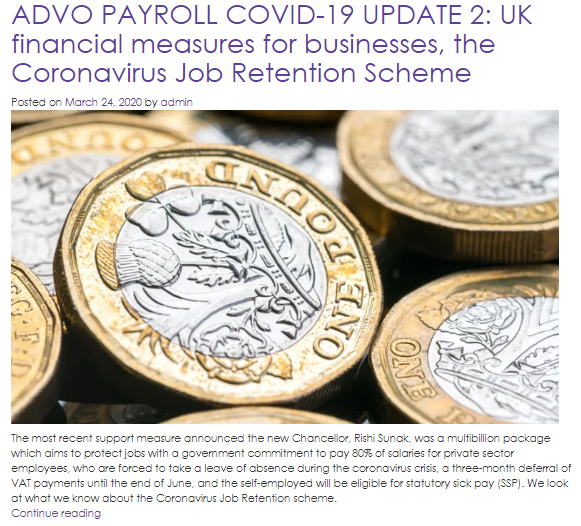The recent Budget from the new Chancellor, Rishi Sunak, included £7 billion of expenditure targeting the impact of Covid-19 on employees, the self-employed and businesses. Six days later a further raft of measures was announced, amounting to an additional £20 billion of support expenditure plus £330 billion of loan guarantees. This is what we know so far.
The Chancellor’s 17 March statement was accompanied by a repeated promise that he would do “whatever it takes” to counter the impact of the virus.
The most recent support measure announced was a multibillion package which aims to protect jobs with a government commitment to pay 80% of salaries for private sector employees, who are forced to take a leave of absence during the coronavirus crisis, a three-month deferral of VAT payments until the end of June, and the self-employed will be eligible for statutory sick pay (SSP).
The government’s coronavirus job retention scheme is open to all private employers regardless of size. Initially this will be in place for three months. Government grants will cover 80% of the salary of retained workers up to a total of £2,500 a month. The scheme will be backdated to 1 March 2020. Click here or on the link at the bottom of the page for more information.
HMRC is working on changing their IT systems to set up the scheme. It is anticipated that this will take until April to complete as it will require complex changes to PAYE reporting.
IT software providers will also have to update their PAYE software as well before businesses will be able to automatically add furloughed workers to their payroll systems. Once updates are received from HMRC, advo’s own payroll system will be adapted to the new rules.
One of the most important issues the government needs to clarify is whether the job retention scheme will apply proportionately in the case of employees who may have had to move to part-time working during the crisis.
We thought it would be useful in this ever-changing environment that we give you a general update on the general business changes and what we know so far. Outlined below is a round-up of the key announcements so far for businesses and individuals including useful links to government sites.
Measures for business
Coronavirus government statutory sick pay (SSP)– and how to apply for it
The government will meet the cost of coronavirus statutory sick pay (SSP) for small businesses with up to 250 employees for 2 weeks, providing over £2 billion for up to two million businesses.
SSP will now be available for eligible individuals diagnosed with coronavirus or those who are unable to work because they are self-isolating in line with government advice.
The weekly allowance for SSP will increase from £94.25 to £95.85 on 6 April.
This is in addition to the change announced by prime minister Boris Johnson that SSP will be payable from day one instead of day four for affected individuals.
- People who are advised to self-isolate for coronavirus will soon be able to obtain an alternative to the fit note to cover this by contacting NHS 111, rather than visiting a doctor. This can be used by employees where their employers require evidence.
- Coronavirus statutory sick pay is expected to be in the form of a refund. The Treasury says that it is “working with employers over the coming months to set up a repayment mechanism as soon as possible for employers reclaiming statutory sick pay”.
Loan guarantees
In his latest announcement, the Chancellor has vastly extended the government-backed loan guarantee scheme revealed in the Budget. The Government will now provide loan guarantees up to “an initial” £330 billion for all sizes of businesses:
- For small and medium sized businesses, the loan limit on the Coronavirus Business Interruption Loan Scheme (originally announced in the Budget at £1.2 million) is now £5 million, with no interest due for the first six months.
- For large firms, the Bank of England is launching a Covid Corporate Financing Facility (CCFF), which “will provide funding to businesses by purchasing commercial paper of up to one-year maturity, issued by firms making a material contribution to the UK economy”.
Both loan schemes are intended to be “up and running by the start of next week”, i.e. from 23 March.
Business Rates Retail Discount.
All shops, cinemas, restaurants, music venues and business operating in the leisure and hospitality sectors will have no business rates to pay in 2020/21.
On 17 March the Chancellor also promised an additional cash grant of “up to £25,000 per business” to businesses with a rateable value of less than £51,000 – i.e. those that would have benefited from the old version of Business Rates Retail Discount Scheme.
Businesses already eligible for small business rates relief
There will be a flat £10,000 cash grant for each business that already benefits from zero or reduced business rates because of small business rate relief.
Insurance cover
Although the government has not required the leisure and hospitality businesses to close, on 17 March the Chancellor said that “for those businesses which do have a policy that covers pandemics, the government’s action is sufficient and will allow businesses to make an insurance claim against their policy”. However, pandemic cover is not a feature of most business disruption cover, a point underlined by the Association of British Insurers in a statement it issued on 17 March.
Off-payroll working in the private sector (IR35)
Also on 17 March, the Chief Secretary to the Treasury, Steve Barker, said in a statement to the House of Commons that the start date for the new IR35 tax rules would be deferred to 6 April 2021.
Time to Pay (TTP)
In the Budget, the Chancellor announced that HMRC would scale up its Time To Pay service, giving businesses and the self-employed the chance to defer tax payments.
Government guidance for employers and businesses is here.
Measures to help your employees
Mortgage holidays
For people who find themselves in financial difficulties because of coronavirus, mortgage lenders will offer at least a three-month mortgage holiday.
Statutory sick pay (SSP)
SSP is currently paid at the rate of £94.25 a week, rising to £95.85 from April. It is now available to employees from day one, instead of day four, for those who are suffering from the virus or who have been advised to self-isolate. So far there has been no change in the minimum earnings threshold for SSP (£118 a week currently, rising to £120 a week in 2020/21).
Individuals ineligible for SSP
Self-employed and gig economy workers generally do not qualify for SSP. Instead they may be entitled to Contributory Employment and Support Allowance (ESA – a basic £73.10 a week for those 25 and over, rising to £74.35 in 2020/21).
Covid-19 sufferers and self-isolators will be able to claim the benefit from day one instead of day eight. The minimum income floor in Universal Credit (UC) has been temporarily removed to ensure that time off work because of sickness is reflected in benefits.
Hardship Fund
The Chancellor announced in the Budget a £500 million Hardship Fund, which would be distributed to Local Authorities so that they could support the vulnerable.
Additional support
On 17 March the Chancellor announced that he was developing “new forms of employment support to help protect people’s jobs and incomes”. More information should emerge in the coming days.
Government guidance for employees can be found here.
We are here to help. If you are an advo client and need guidance on your payroll or payroll related queries included in the enclosed update then please get in touch with the team on payroll.ops@advo.co.uk.

Andy Henderson, advo Payroll Manager




